Bitcoin in Africa: a monetary escape route
Africa Drives Adoption – It’s been 5,153 days since Bitcoin was launched on January 3, 2009. Every day since then, people have heard about it for the first time and become interested in it, while others have joked that this virtual money is a funny idea. At the same time, some people want to become rich while others find the technology great. But mostly, people are using Bitcoin every day because it’s a good tool. Because it is a very simple and effective way to solve sometimes insurmountable problems.
Faced with complicated financial situations or an unstable monetary environment, millions of people around the world are turning to Bitcoin out of necessity. Without necessarily understanding the technology. Without perhaps having read the white paper thoroughly. No, just because it works. Just because it’s easy to use and suddenly break through barriers that have been in place for far too long. Satoshi Nakamoto’s invention is becoming more and more popular on all continents and especially in Africa where people are embracing the future of money with pragmatism and enthusiasm.
Bitcoin and Africa, second episode
Last week, we talked about financial inclusion issues as well as the financial landscape in which Bitcoin had arrived. With mobile money and exchanges, we saw that it was now possible to get crypto in most countries in Africa. Today, the exploration of the continent continues with concrete examples of the problems it helps solve and the situations in which it is needed. But, before we get into the nitty gritty, a number.
A simple percentage given by the World Bank. Only 13% of the world’s population was born in the dollar, the euro, the Japanese yen, the British pound, the Canadian dollar, the Australian dollar or the Swiss franc. The remaining 87% grow up in a country with a fragile or unstable currency, or even one that is losing value. This reality reminds us that everyday currency problems are not marginal on our beautiful planet. That they are even very common and that the vast majority of our contemporaries suffer from them every day. So let’s cross the Mediterranean and go south to see what people’s daily lives are like. Welcome to our second column on Bitcoin and Africa.
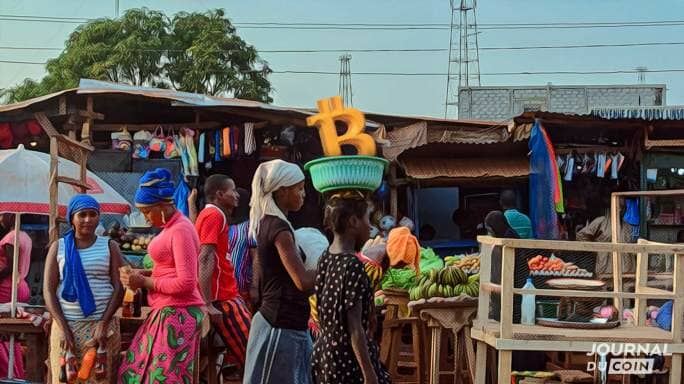
In Africa, trade is unbalanced towards the outside
Poor intra-African trade figures
A word of macroeconomics to begin with, with an issue highlighted by the International Monetary Fund (IMF). One of their publications sheds light on intra-continental trade. With 55 countries and over a billion people, one would expect trade between neighboring countries to be significant, but it is not. Not at all. Unlike Asia, where 60% of import-export is continental, or even Europe, where the figure is 70%, in Africa it is only 15%.
IMF experts note the lack of transport infrastructure, high customs duties, divergent trade rules and the sizeable informal economy. But above all, they stress the cost and difficulty of cross-border payments. Hence the need to find an alternative and to change the rules of the game. This is why a continental trade zone project was put on the table a few years ago. More precisely, it is 2018, when 54 African countries signed a free trade agreement in Kigali during an extraordinary summit of the African Union. Only Eritrea did not want to participate, but we will return to this particular country in a future column.
>> Diversify your portfolio! Register on Trade Republic and receive €20 (subject to a €2000 deposit) to take action (trade link) <<
The FTAA project as a miracle solution in Africa?
This African Continental Free Trade Area (AfCFTA) is expected to phase out tariffs on 90% of goods and reduce barriers to trade in services. Eventually, this agreement should even allow for the harmonization of policies on investment, e-commerce and intellectual property.
In parallel, a Pan African Payment and Settlement System (PAPSS) is in the works. It will link Africa’s central banks, commercial banks and fintechs in a network. Fast and cheap transactions in any of the 42 currencies on the African continent will become possible. So, on paper, experts hope for a significant increase in intra-African trade by 2045. But in the meantime, China, the European Union and the United States continue to account for more than 50 percent of exports. And they don’t seem to be in a hurry to see this FTAA challenge their privileges.
The current lack of fluidity of exchange from country to country and across the continent is probably one of the main reasons for the adoption of Bitcoin in this part of the world. In an attempt to grasp the complexity of these situations, we’ll take a few countries as examples to highlight some of the issues. To start, let’s head to the shores of the Gulf of Guinea and Ghana.
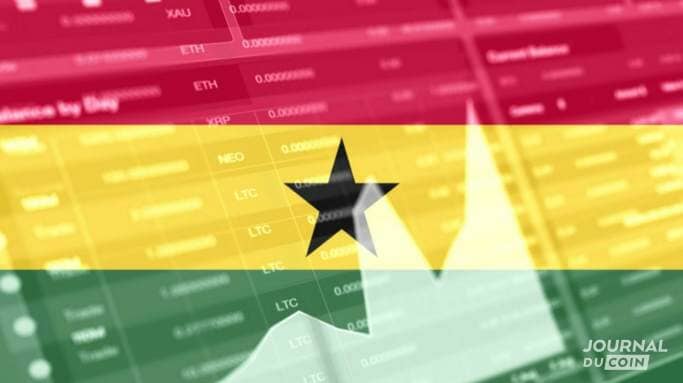
In Ghana, Bitcoin to facilitate cross-border trade
Restriction on foreign currency
Let’s start with a little geography. Ghana is surrounded by three countries that use the CFA franc as their currency: Côte d’Ivoire, Burkina and Togo. Its currency, the cedi, has been one of the biggest decliners of the last ten years, losing over 80%. Combined with record inflation, the Ghanaian currency is in perdition.
This catastrophic situation has led the local authorities to take decisions that will unfortunately accentuate the problems. Restrictions on foreign currency in the country are flourishing and the central bank is pounding its fist on the table. It prohibits the payment of goods and services in foreign currency without written authorization.
The black market and smuggling as the only solution
Prince Don, our guide from the previous episode and host of Africa Speaks Bitcoin, gave us an example of the consequences of this near his home. It was about a Ghanaian entrepreneur who wanted to trade with a neighbor in Côte d’Ivoire. In concrete terms, this person would like to buy materials in Ghana to resell them in his country. So far, nothing extraordinary. Well, he can’t.
At least not officially, anyway. Because he would have to go through his bank and apply to convert his CFA francs into dollars. Then transfer the funds to Ghana. This request would go through banks abroad because all transactions in Côte d’Ivoire go through banks that use the euro. These banks would therefore apply an exchange rate to the CFA to euro transaction. Then euro to dollar. Then, they would add a transfer fee to the bank in Ghana. All this takes time and costs a lot of money. So, until now, he was getting by with cash and the system D.
Another example found on the IMF blog and still in Ghana. Someone in Accra wanted to pay a lawyer living in Nigeria. The money took two weeks to arrive! And, for a transaction of 100 dollars, he had to pay 40 in fees. Yet, these two countries are linked to banks that use the dollar. But in reality, it works very badly. As a result, entrepreneurs are circumventing the laws, taking risks and losing money. Now, more and more of them are using Bitcoin. It’s simple, fast and cheap.
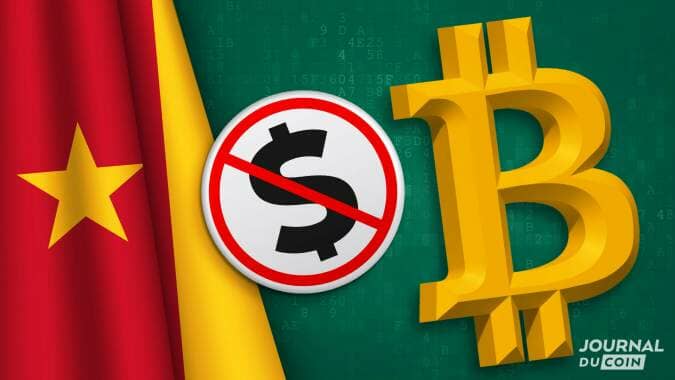
>> Find Bitcoin on Trade Republic and receive a €20 gift (subject to a €2000 deposit) upon registration (commercial link) <<
In Cameroon, Bitcoin to fill the currency shortage
Currency signs are the subject of speculation
Another example in a country that uses the CFA franc: Cameroon. The situation in Yaoundé will allow us to address another problem encountered by many countries in the subregion: the shortage of currency. The country lacks CFA currency, but also dollars. The Bank of Central African States (BEAC), which manages part of the countries under the CFA franc, did try to solve the shortage last year, but the problems persist. The country is short of banknotes, but especially coins. As a result, small businesses are suffering and the situation is getting tense.
Authorities accuse some traffickers of sending the coins to Asia to be melted down and made into jewelry. But it also seems that slot machine owners are involved. The latter would also retain the coins to increase their value by creating an artificial shortage. Finally, the last explanation is that the distribution circuit is partly “rusty” according to the authorities. In any case, everyone is running out of money and daily trade is getting out of hand.
These dollars impossible to find in the country of the CFA franc
But the CFA franc is not the only currency that is difficult to find in the country. The dollar is also absent and this situation has been going on for years. Prince Don told us the unbelievable story of a Cameroonian entrepreneur who had to pay a large order to a supplier in China. He went to his bank for payment in dollars and the bank told him that he was on the waiting list. The bank in question is waiting for dollars from the BEAC, which is out of money.
He will have to wait between 1 and 2 months to be able to pay this order. Let’s be clear, the merchant has the amount in CFA francs in his account. But the bank does not have enough dollars to complete the transaction. This is the reality of big business. For all those who thought that banks were just writing lines on charts, the reality in Africa is much more concrete. No dollars, no orders. No orders, no business. So, guess where these entrepreneurs turn?
In the same vein, we could also have mentioned Angola or Ethiopia, which are experiencing the same problems. In Addis Ababa, the government has drawn up a list of priority goods that can be imported in dollars. For the others, they can only be paid for in birr, the local currency, which is plunging against the dollar on the black market. But let’s leave East Africa and head for the most populous country on the continent: Nigeria.
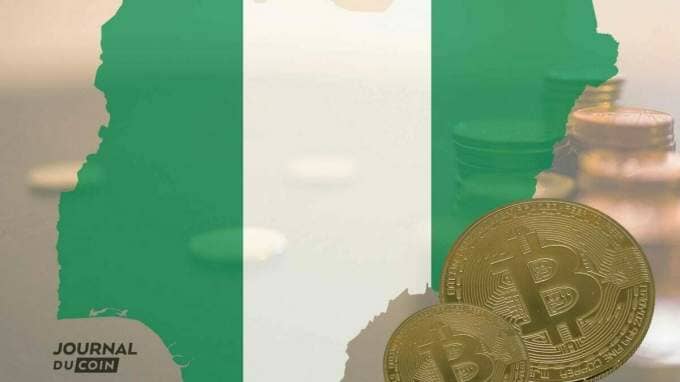
In Nigeria, Bitcoin is a monetary emergency exit
A remedy more harmful than the evil?
Nigeria alone brings together all the problems raised in our article. Rampant inflation, a shortage of dollars and a counterproductive monetary policy by the authorities. Let’s start with the local currency, the naira, which has lost more than 60% of its value over the last ten years. And despite the gradual introduction of the eNaira, the electronic currency, nothing has changed. And the recent rise of the dollar has not helped.
As a result, the authorities have taken drastic decisions to try to conserve their foreign exchange reserves. Last September, they ordered the airlines to accept the naira for the payment of airline tickets. On pain of sanctions! Because the dollar is officially banned in the country. Professionals and individuals are therefore no longer allowed to convert their naira. As a result, on the black market, the price of the greenback is skyrocketing because everyone is using it to escape from this too fragile naira.
Bitcoin price soars due to government restrictions
But local currency is also rationed. And at the time of writing, withdrawals are capped at 20,000 naira per day, the equivalent of 40 euros. But the worst is yet to come. Because this scarcity of currency is leading to a kind of rush on Bitcoin, which, remember, is not allowed in the country either. To find Bitcoin, you have to go through peer-to-peer platforms because banks are not legally allowed to accept transfers or payments to crypto exchanges.
Finally, due to the age-old law of supply and demand, Bitcoin has a 65% premium over the rest of the world. This country, which is pulling all of Africa behind it in terms of adoption, finds itself paying full price for its satoshis. All this because of a succession of bad decisions by its government. In this situation, it is hard to blame the people of Nigeria who are desperate to get their savings out of the country. Think of someone who has been saving for 10 years to buy a house or to pay for their children’s education and sees the fruits of their savings melt away by 80% in a few years. Under these conditions, the only viable solution available now is Bitcoin. Once again.
After the economic problems, let’s turn for a moment to a situation even more dramatic than uncontrolled inflation and a shortage of foreign currency. Let’s go to Sudan, which has been shaken by a terrible civil war for years.
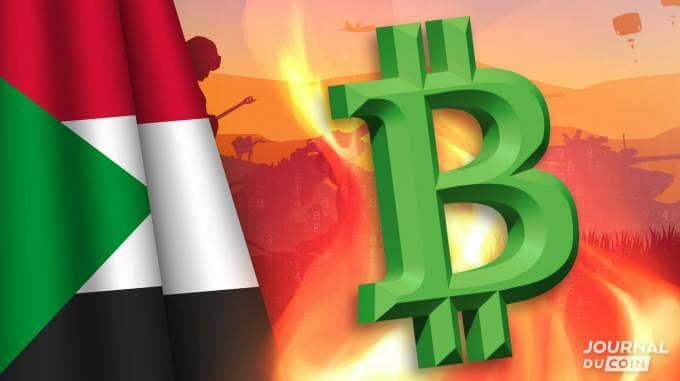
>> Diversify your portfolio! Sign up for Trade Republic and receive €20 (subject to a €2000 deposit) to take action (trade link) <<
In Sudan, Bitcoin to escape the consequences of war
Armed conflicts that ravage the country
Sudan is one of the poorest regions in the world with a very worrying humanitarian and economic situation. Two terrible civil wars have torn the population and the country apart. The one in the south gave birth to a new state, South Sudan. In the west, the situation in Darfur is far from being resolved and abuses against the civilian population continue. Neither the coup d’état in 2019 that brought down Omar al-Bashir, nor the next one in 2021, have solved the problems of daily life. Worse, the tap of humanitarian aid has dried up because the interim government does not meet the conditions dictated by the international community.
Inflation has reached 360 per cent in 2021 and has peaked at 260 per cent this year, according to various sources. Riots have broken out in recent weeks in Khartoum to protest against rising prices, which are strangling the entire population already hard hit by the conflicts. Sudan is piling up problems, with a weak administration and a desperate currency. This is particularly true following a final devaluation last year, which was imposed by the IMF.
Internet and Bitcoin as a ray of hope
It is in this largely degraded context that we learn that major companies are investing in the region to improve Internet coverage. Sudan has a 31% penetration rate for its 46 million inhabitants, which is better than many other African countries. So much for the paradoxical setting of a war-torn country that is opening up to new technologies to get out of it. Now back to crypto and the story of the man Bitcoin Magazine called Mo. Born in Sudan and a doctor, he fled his country after treating victims of warlords and militias of the deposed dictator. Then, from Europe, he will witness decades of conflict and crimes against humanity without being able to help his family, friends or community.
But that all changed in 2015 when he discovered Bitcoin and started using it. In 2017, he sends satoshis to Sudan for the first time. Since then, on social networks, he has become a kind of crypto influencer dedicated to the BTC cause. Hosting a podcast in Arabic for Sudanese youth, Mo talks with them about money, freedom, the country and satoshis. Today he is happy about the increase in internet coverage that is slowly reaching the most remote areas of the country along with smartphones. So much good news for the democratization of his favorite crypto.
But Mo still fears a reversal of the situation and does not trust the country’s authorities. He fears that Bitcoin will be banned. Indeed, the Central Bank of Sudan has warned its population against using the cryptocurrency, presented… too volatile and too risky.
Let us stay in the Horn of Africa for a while longer and now turn our attention to Ethiopia where weapons have also taken their toll. The Tigray war that took place very close to the border with Eritrea in the north of the country would be the worst conflict of the XXIᵉ century. More than 600,000 dead according to UN reports. In this country under reconstruction, rural areas predominate and the population suffers from historical financial isolation. But in the cities, Bitcoin is opening a door to the rest of the world.
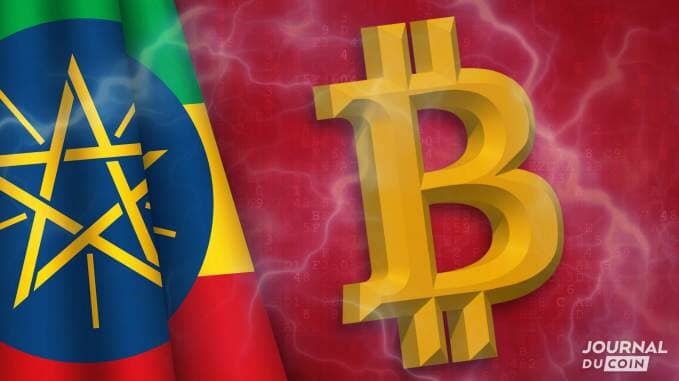
In Ethiopia, Bitcoin to replace salt or cattle as medium of exchange
A fragile ancestral economic model
First of all you are used to it, some figures. Ethiopia has 120 million inhabitants of which 20% are connected to the internet. Among them, the 5 million who live in the capital Addis Ababa. It is estimated that more than 70% of the population does not have a bank account, especially the large part of the inhabitants of rural areas.
In these isolated and arid regions, survival is very complicated due to repeated droughts that decimate the herds. But inflation and the weakening of the birr, the local currency, also increase the pressure on these populations whose ancestral traditions are still very much alive. Some indigenous peoples in the northeast, for example, continue to use salt as a medium of exchange for daily trade. In the rest of the country, cattle or sheep are also used as currency and much more rarely gold.
From California to Addis Ababa, Bitcoin as a currency link
In the country’s major cities, the dollar has historically been the currency of choice. But in recent years, the local government has sought to combat inflation by prohibiting the use of this currency among the general population. As a result, on the black market, the price of the greenback is exploding. That’s how our story begins. The story of Kassa, whose brother was imprisoned for walking around with 20 dollars in his pocket.
Kassa was born in the country but left at a young age and grew up in California. He returned in 2013 to work for an international auditing firm. Finally, after almost 10 years of living in his country, he is forced to leave it once again after the authorities cut off the internet in 2020 during the pandemic. When he boards the plane to leave, he has an epiphany. He thinks of all the people he is leaving behind. Kassa wonders how to take his savings with him when they are animals!
He will create groups on private messengers to hire people on site and pay them in satoshis. Graphic designer, designer receive their emoluments from California via wallets like the Blue Wallet. It is especially appreciated because it is open-source. Some resell them in peer-to-peer on the local market to get birrs. But he confides that many use it to start saving. Transferring value via Bitcoin avoids the 10 to 15 percent fee charged by international money transfer specialists, but also bypasses the government’s prohibitive exchange rate. In fact, the government is still tracking satellite phone users and doing everything it can to counter the advance of Bitcoin in the country.
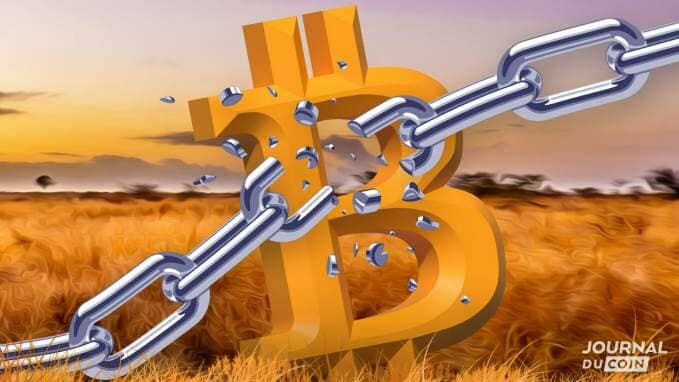
Bitcoin, defender of human rights in Africa, next time
In Ghana, Nigeria, Cameroon, Sudan and Ethiopia, we have seen how Bitcoin can simplify people’s lives and solve some of their daily monetary problems. We could also have mentioned Egypt or Malawi whose devalued currencies are throwing the population into precariousness. Or Burundi and Libya which are undergoing various international embargoes because of an unstable political situation. But it is time to close this second chronicle and leave behind the financial, economic and monetary problems.
Next week, we’ll discover together that Bitcoin can also be a weapon as well as a tool. For some organizations fighting for freedom or for minorities, financial censorship used to be a weapon of mass destruction of hope. Today, the rules are changing and free spirits are going underground. In Togo, Congo, South Africa, Eritrea and Senegal, a wind of hope is blowing. Human rights defenders have discovered a powerful ally: Bitcoin.
